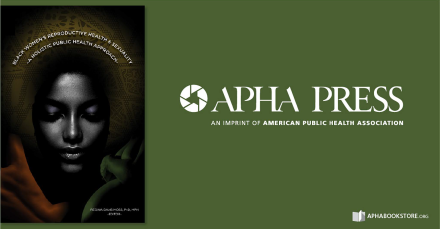Faustin and co-authors focused on the importance of mixed methodologies to better study health trends and issues in the Black diaspora for “Black Women’s Reproductive Health and Sexuality: A Holistic Public health Approach.”
Share:
Assistant Professor of Public Health Studies Yanica Faustin recently published a chapter in a book for researchers and practitioners about Black women’s reproductive health.
“Black Women’s Reproductive Health and Sexuality: A Holistic Public Health Approach,” was edited by Regina Davis Moss and published by the American Public Health Association’s APHA Press in August. Faustin’s chapter, “We are not a Monolith: Nativity, Racial Discrimination, and Maternal/Infant Health Across the Black Diaspora,” was co-authored with Kristin Z. Black, assistant professor of maternal and child health and health behavior at the University of North Carolina’s Gillings School of Public Health, and Jon Hussey, assistant professor of maternal and child health at the University of North Carolina’s Gillings School of Public Health.
 Their chapter focuses on the importance of using both quantitative and qualitative methodology and using an interdisciplinary lens to approach public health research involving Black maternal health. Their research examined health disparities among the Black diaspora in New York City with attention to where residents were born — in the U.S., Africa or the Caribbean — and how the duration of their residence in the U.S. and exposure to racial stress impacted the odds of preterm delivery.
Their chapter focuses on the importance of using both quantitative and qualitative methodology and using an interdisciplinary lens to approach public health research involving Black maternal health. Their research examined health disparities among the Black diaspora in New York City with attention to where residents were born — in the U.S., Africa or the Caribbean — and how the duration of their residence in the U.S. and exposure to racial stress impacted the odds of preterm delivery.
“Much of my work highlights the fact that there is less research on the smaller but growing population of Black foreign-born women giving birth in the United States. Studying their outcomes has the potential to reveal new insights into the etiology of US racial and ethnic health inequities more broadly,” Faustin said.
Faustin and co-authors stress that considering nativity in research may inform more robust data collection and tailored interventions for Black birthing persons, showing that while Black birthing persons are at an increased risk of experiencing both general and pregnancy-related discrimination, the health impact of racial stress varies based on region of origin.
“Black Women’s Reproductive Health and Sexuality” aims to remedy the underrepresentation of Black women in reproductive and sexual health research while providing a comprehensive guide to the field of Black women’s reproductive health and sexuality, including its history and future. Its audiences include academic researchers, research institutes and public health practitioners.
“The chapter provides an overview of the relationship between nativity, racism and maternal health,” Faustin said, while “also providing lessons learned that can be incorporated into health policy development, data collection practices and methodological approaches to health inequities research.
“Readers will learn that while all Black persons face the oppressive systems that exist, there is variation in the resulting health outcomes within this population. It’s important to include the diversity of experiences within the Black population that lives in the United States where these racial maternal health inequities persist.”

